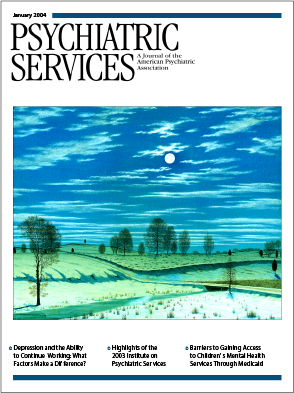Predicting Inpatient Length of Stay With the Expanded Version of the Brief Psychiatric Rating Scale (Version 4.0)
Abstract
This study examined whether assessment data from administration of the extended version of the Brief Psychiatric Rating Scale (BPRS-E) to state hospital patients within 72 hours of their admission could be used to predict length of hospital stay. BPRS-E data for 222 first-admission patients, for whom the mean length of stay was 118.4±88.6 days, were factor analyzed, yielding a model with four factors: patient's resistance to treatment, positive symptoms, mood, and negative symptoms. Discriminant analysis showed that the negative symptoms factor (blunted affect, emotional withdrawal, motor retardation, self-neglect, and disorientation) correctly predicted whether length of stay would exceed the mean in 94 percent of cases. The findings suggest that the severity of negative symptoms can be a useful predictor of length of stay among patients with severe and persistent mental illness.



